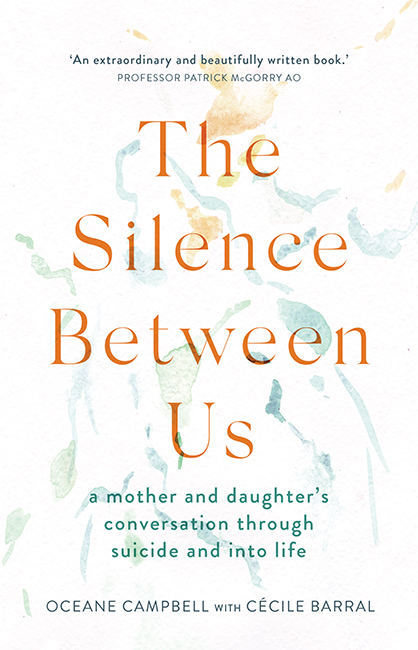
The Silence Between Us
A Mother and Daughter’s Conversation Through Suicide and into Life
By Oceane Campbell and Cécile Barral
Hardie Grant Books
ISBN: 9781743796702, Paperback, 336 pages, $34.99aud, September 2021
The events that the place in Oceane Campbell and Cécile Barral’s The Silence Between Us are set in 2002, and it would be easy to think that things have improved since then. Unfortunately that does not appear to be the case. Just this week in 2022, a report commissioned by Universities Australia found one in 20 students had been sexually assaulted since starting at university. The National Student Safety Survey report also found one in two students had experienced sexual harassment at least once in their lifetime – that’s 48% – almost half of all students, and probably a majority of the entire female university population. For a parent of a daughter at an Australian university, these statistics are chilling, and they are paralleled by recent claims of sexual harassment in government, at high profile workplaces, and in domestic situations everywhere. While sexual assault is not the sole focus of Oceane Campbell and Cécile Barral’s memoir, it’s the underlying dark force that provides a catalyst to the events that take place. It’s not just the abuse itself that perpetuates from generation to generation and from the first pages of Oceane’s diary when she writes “I hate you I hate you I hate you” in her diary–signaling that Oceane has begun to turn her hatred inward. It is also the systems of oppression and silencing that perpetuate sexual abuse and the cult of silence that surrounds them at Oceane’s university, and in her family, creating the self-hatred that propels Oceane’s violent suicide attempt. The discomfort that comes with the this act of silence breaking is considerable. I had to keep pausing in my reading to do deep breathing, and even, on occasion to cry. The book is intense with an immediacy that enables a reader to simultaneously feel Oceane’s despair and Cécile’s desperation first hand:
Drugs won’t change what is going on. My racing heart when I hear footsteps approaching my door. My constant shame. My loneliness and feeling like a fraud around others. I’ll always be like this while I am in this situation, and there is no point in them just increasing the drugs each week when I say I am still miserable. This year, the assault and all that it brought up has erased the parts of my life that were happy, the times that sustained me through the rough. I can no longer picture the freedom and exaltation of horseriding as a kid, of walking to the waterfall near our house for overnight adventures with marshmallows and bread cooked on the open fire. (14)
The book alternates between diary entries for Oceane and Cécile, working across a matched time trajectory, along with excerpts from hospital notes and psychiatric reports, snippets of dialogue, emails, and transcripts. Cécile’s diaries were particularly moving to me, as a parent, in their striving to get the balance between overattentive anxiety and caring, particularly in light of what we know to be happening through Oceane’s diaries:
The utter pleasure – and utter pain – of the moment I hear your voice. You, alive. Yes, it is your voice on that phone line. I recognise it and yet I am not sure who you are anymore. (30)
What also becomes apparent is how deep the structural failures – one after another – from the University’s failure to protect and provide support to Oceane throughout her abuse, and after the suicide attempt, when she is repeatedly ostracised, disrespected, and bullied. The hospital system also fails her with its dehumanising treatments, the assumptions they make about her, and the unsafe practices that we come to understand are inherent. The theme throughout the book is silence—not just the silence spaces which are opened between mother and daughter in this extraordinary book, but the attempts by those who have power over Cécile and Oceane, to silence the uncomfortable truths they present as they move towards healing. These are truths about the way power structures can undermine the health and safety of the people they are set up ostensibly to protect, and truths about how we can also silence ourselves in order to fit in, or not cause too much trouble even at the expense of our mental health and wellbeing.
Both Oceane and Cécile are beautifully articulate, carefully unpicking their own wounds to find something universal in their experience. In breaking their silence, Oceane and Cécile create an allyship between mother and daughter that reverberates beyond their changing relationship to one another, themselves, their histories, and the world they live in. What becomes clearer as the story progresses is that these two stories, which begin with such opposing understandings are actually one and the same – that the healing that takes place comes through a recognition of interdependence. By the time the story finishes, the initial discomfort changes into ownership and recognition that societal structures that caused such harm to Oceane and Cecile cause harm to us all (including those doing the harm), and that the way forward is always through opening lines of communication, and facing down the oppression, as indeed Oceane does. By so openly and vulnerably sharing their journey, Oceane and Cécile also provide all of us with a mandate to take open responsibility for our flawed mental systems, the toxic cultures at our organisations and universities, and also to celebrate those who speak out and thereby set a precedent for others to follow. The Silence Between Us is deeply affirmative and important book.